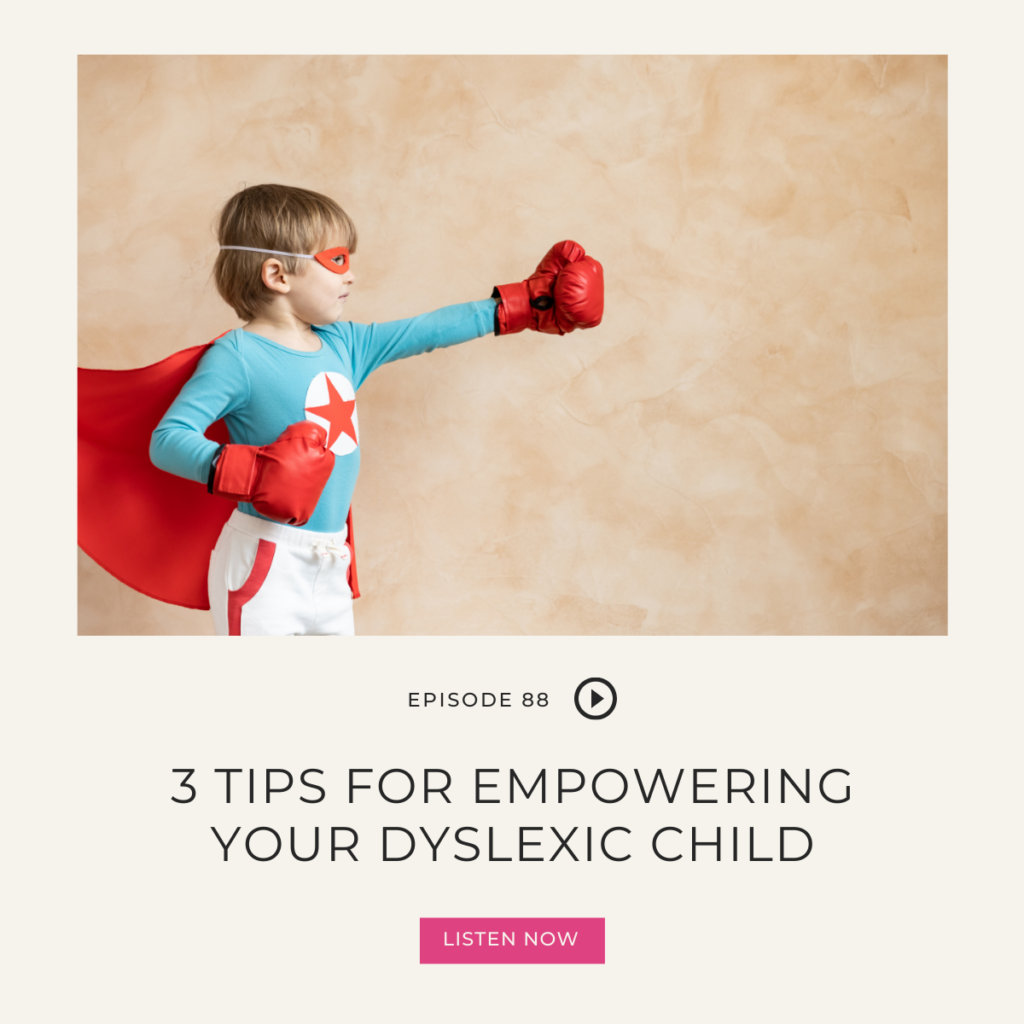
TUNE IN: APPLE PODCASTS | STITCHER | SPOTIFY
3 TIPS FOR EMPOWERING YOUR DYSLEXIC CHILD
- Focus on Interests and Strengths
- Create a Non-Judgemental Environment
- Model a Growth Mindset
Tip #1 – Focus on Interests and Strengths
Tip #2 – Create a Non-Judgemental Environment
For children with dyslexia, there are a few things to keep in mind. Most are very literal and have strong feelings of empathy. While some children, maybe even you did this as a child, can just brush off a critical comment made by a parent your child with dyslexia may internalize your critical comment. So, what can you do?
Start with being aware of your responses, yes you are human so there will be times that you may say something out of frustration that you later regret. What a great teachable moment. Apologize to your child. This is a great way to model how your child can respond to others when he says something that he later regrets or hurts someone’s feelings.
Once you are aware of your comments to your child, reframe them in a more non-judgemental language.
For example, when frustrated with your child for not doing his chores you may respond “As usual, I have to just do it for you.” What if instead, you said, “Why don’t you give it another try and remember I’m here if you need me to help.” Think for a minute who it might feel to receive each response. Does one feel more supportive? Keep in mind that many children with dyslexia may also struggle with memory, verbal processing, and executive functions. In other words, if you gave your child a list of 4 things to do she forgot them all by the time she got to her room. We can do better. Ask your child to do one thing and come back when she finishes it – this teaches her instead of pointing out her weaknesses, things she can’t control but can learn how to thrive.
Full Focus Planner by Michael Hyatt– $10 off if you order by 12.20.21
Tip #3 – Model a Growth Mindset
What is a growth mindset?
People with a growth mindset believe that their abilities can be developed. Put another way, they believe they can learn to be smarter, more creative.
According to author Carol Dweck, people with a growth mindset are motivated to put effort into learning and improving themselves. As a result, they are more likely to see failure as something they can learn from.
What is a fixed mindset?
People with a fixed mindset believe that their abilities are fixed. For instance, they believe that some people are smart, and other people are not. The same applies to other abilities such as being musical, creative, artistic, or athletic.
Growth Mindset Example, conversations with children . . .
In an effort to relate to your child struggling with learning her multiplication facts, you may say that you were always bad at math. I’ll admit, I’ve said this in the past. But, now I know when she is struggling with math I need to reframe it to something like “Math can be a challenge. Let’s try a few ways to study to see what may help you learn your multiplication facts.” – then try flashcards, apps, etc. to help your child. What a great way to teach your child how to figure out how to best study. If she likes science, you can tell her let’s experiment to see what works best for you. Allow her to make mistakes, talk through what she learned, and decide on other ways to study or solve a problem. It is going to be tempting to swoop in and just do it or fix it for her. Work with her, not for her. We want our kiddos to one day to be independent learners. This is the first step. If you just settle for your bad at math guess what she will just be bad at math but if you teach her strategies that are small wins she will figure out how to be better at math, not a math genius but confident that she can figure it out even if it’s not her favorite subject.
If you want to learn more about empowering your child.
Marianne Young provides great examples in her book Raising Exceptional Children: A Guide to Understanding Learning Differences and Empowering Your Child. I interviewed Marianne on the podcast too, episode 26.
DID YOU ENJOY THE SHOW?
Don’t miss an episode – subscribe via Apple Podcasts or Stitcher.
- Leave a review of the show in Apple Podcasts.
- Join the conversation by leaving a comment below or join our amazing mom tribe in our private Facebook Group for the show, Dyslexia Mom Life Podcast Community. It’s free!
- I’d love to hear about your parenting journey and what is on your mind, how can I help. Connect with Nicole on Instagram ~ drop in my DMs to say hi and introduce yourself and your amazing dyslexic kiddo.
- Share the show with a bestie, “friends” on social, or save to Pinterest (as a bookmark to refer back to later).